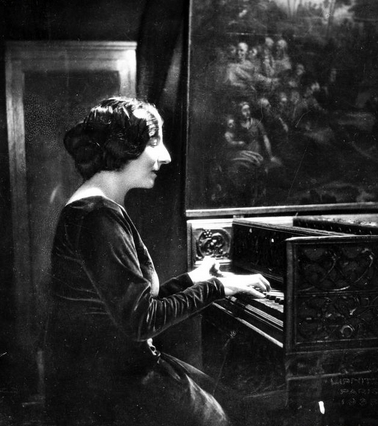Landowska, Wanda 1879 - 1959

Author: PWM Edition
Last updated:September 30, 2022
Author: PWM Edition
Wanda Landowska
(1879, Warsaw, Poland – 1959, Lakeville, USA)
Wanda Landowska was a Polish pianist, composer, and one of the most significant figures in the revival and popularization of the harpsichord in the 20th century. Born in Warsaw in 1879, she began piano lessons at an early age. She later studied piano with Aleksander Michałowski at the Warsaw Conservatory. After graduating from the Conservatory in 1891, she moved to Berlin and studied composition with Henryk Urban, known for teaching figures such as Ignacy Jan Paderewski. Upon moving to Paris in 1900, she developed an interest in early music, particularly the works of Johann Sebastian Bach. Although Landowska initially performed on the piano, the harpsichord soon became her primary instrument. For many years thereafter, she collaborated with prominent French musicians and musicologists to explore the intricacies of early music performance practice.
Devoting herself to the study of harpsichord music from the Renaissance and Baroque periods, she eventually partnered with the piano manufacturer Pleyel. In 1912, at the J.S. Bach Music Festival in Wrocław, Landowska herself performed and unveiled a harpsichord built by Pleyel based on her specifications. Pleyel soon after patented this model of harpsichord and began continuous production.
In 1913, Wanda Landowska taught at the Berlin Hochschule für Musik, establishing the world's first harpsichord class. Throughout the 1920s, she gave numerous concerts in America and Europe. In 1925, she settled in Saint-Leu-la-Forêt, a suburb of Paris. Landowska was also the founder of the School of Early Music (L'École de Musique Ancienne). At this music center, she performed and lectured, and also collected scores and historical instruments.
In 1934, Landowska gave the world's first complete performance of J. S. Bach's Goldberg Variations. Her repertoire consistently included works by Domenico Scarlatti, François Couperin, G. F. Handel, and Jean-Philippe Rameau.
Following the outbreak of World War II, Landowska was forced to leave Paris. In 1941, she emigrated to the United States. After living in New York for several years, she moved to Lakeville, where she taught for many years.
Her harpsichord recordings were nominated for Grammy Awards twice, in 1959 and 1961 (the 1st and 3rd ceremonies).
Wanda Landowska passed away in Lakeville in 1959.
Works
- Orchestral work: Hebrew Poem
- Serenade for Strings
- Works for Piano and Harpsichord (without opus numbers)
- Various cadenzas for piano concertos by Mozart and Haydn
- Arrangements and transcriptions of folk songs
